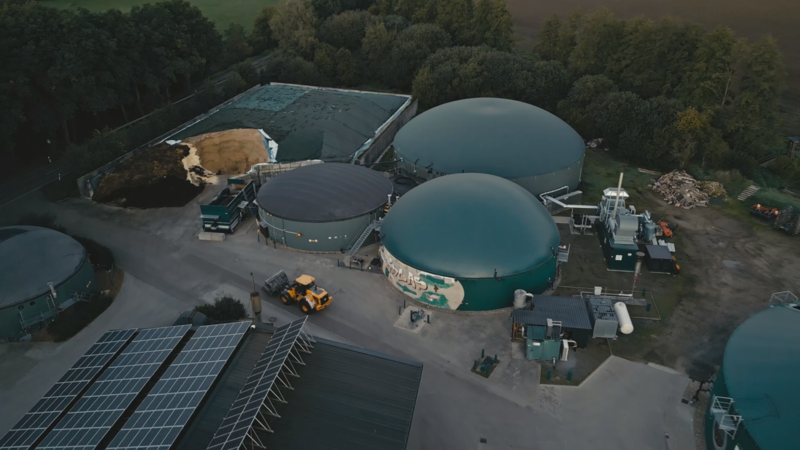Bioenergy straight from the farm
February 29, 2024

The company Benning Agrar-Energie from the municipality of Reken operates combined heat and power systems with buffer tanks and combines secure heating supply with potential earnings on the electricity market. The company proves that biogas has a future across all sectors.
Decarbonizing the heating sector is a massive undertaking. Besides political guidelines, the decarbonization depends on innovative concepts and committed stakeholders that can reconcile climate policy, economic efficiency and acceptance by the local population. The Benning family from Reken in the Münsterland region are pioneers of the field. They efficiently exploit biogas to supply climate-neutral heat to various consumers within the community. The story of Benning Agrar-Energie begins towards the end of the 1990s. Amid an agricultural crisis, the business had two options: increase the animal stock or find a new revenue stream. Hermann-Josef Benning and his wife Ulrike opted for the latter - and consequently ventured into the renewable energy sector. With the foundation of the Benning Agrar-Energie GmbH in 1999, planning started for the two wind power systems that went into operation a year later, but the foundation of today's energy concept was laid with the construction of the farm's own biogas system in 2004. The concept was rounded out by a photovoltaic system in 2009. Within the past two decades, bioenergy has developed into the company's main source of revenue.
Once the first fermenter was built, a combined heat and power (CHP) system with an electrical output of 105 kilowatts (kW) was installed to transform biogas into heat and electricity right there on site. Unlike today, back in 2004 the Renewable Energies Act (EEG) stipulated that the CHP should run 24/7 and that the electricity should always be fed into the grid. Consequently, heat was more of a byproduct when the system first took up operation. However, it soon became clear that this byproduct could be efficiently used elsewhere. In 2005, the Bennings already added another fermenter and another engine. Over the following years, further locations with elevated thermal energy demands were integrated into the portfolio with the addition of satellite CHP systems. Via a miniature pipeline, the biogas flows from the Benning farm to the respective locations while the electricity is fed into the public grid. Today, there is a local energy network which, besides 34 residential buildings, includes schools, nurseries, social services, swimming pools, sports clubs, and businesses. Nowadays, only 20% of the biogas are converted into electricity and heat directly on the Benning farm while the bulk goes to the satellite locations.
Stabilizing effect of bioenergy
The favorable combination of gas production, heating demand and electricity-focused CHP operation is a key factor in this project The growing share of volatile wind and solar energy led to rapid changes in the electricity market. From a market perspective, operating a CHP is profitable, especially whenever the availability of wind and sun is inadequate. Conversely, electricity generation fueled by biogas is scarcely sensible when there is an excess of wind and solar energy. "Multiple satellite locations are equipped with heat buffers that serve as intermediate storage to bridge the temporal offset between heat and electricity demand", explains Ulrike Benning. This way, the potential of cogeneration can be used to full effect. The task of adjusting the biogas production to energetic demands has become a lot more calculable at Benning Agrar-Energie thanks to the experience of more than two decades.
Nevertheless, the Benning family always relies on conversions for the implementation of their concept. They try to involve the local community, politicians and neighboring industries. The family approached reservations towards renewable energies in the same manner. "Most of the time, people did not disapprove of the project but rejected the anonymous investors and business models behind them. From the outset, we tried to take the people on board and build confidence through technical expertise", explains Hermann-Josef Benning. The choice of partners to be involved in the project was another factor. "Especially for maintenance and repairs we have to be able to rely on our partners. For the system's technology, we firmly backed local companies to whom with whom we formed close relationships over the past decades."
As a result of political developments over the past months and years, the interest of the media and the demand increased yet again. "Nowadays, everybody - from industrial operation to private households - is glad to have a personal road map towards the reconciliation of climate neutrality, economic efficiency and security of supply", says Hermann-Josef Benning. Regardless of the evolved supply structures in Reken and their importance, Hermann-Josef does not want to overstate his impact. "We still see ourselves as farmers that offer heat and electricity as products for the daily needs of the local population."
In the past, the Bennings frequently had to overcome political obstacles that stood in the way of their company's development. "From time to time we would get the feeling that bioenergy is the poor relation of the renewables. Again and again, we are confronted with the 'food or fuel' debate. Unfortunately, the fact that field crops are rapidly being replaced by waste materials as input for biogas plants has not yet found its way into the debate. Additionally, many fail to recognize the increasing importance of bioenergy as a stabilizing element in the electricity sector as part of the expansion of wind and solar energy."
Innovation from the countryside
As far as the own company is concerned, the Bennings look forward with optimism. Currently, they are assessing potential ways to optimize the synergy between renewable energies and to prevent the cheaper power sources of wind and sun of needing to be shut down when they are available in abundance. Instead, the excess energy would be used in transformation processes that link the sectors of electricity, heat and mobility CHP systems running on biogas and biomethane can stabilize the grid and the electricity market whenever the opposite is the case - when wind and sun are lacking. Ulrike Benning has some clear words for political decision-makers: "Cities do not only rely on rural areas for food, but also for energy. If political actors finally take the innovative approaches developped by ethusiastic people from the countryside seriously and recognize the true potential, it will lead to the success of the energy transition everywhere."
Stefan Liesner is Head of Public Affairs / Public Relations at the 2G Energy AG.




